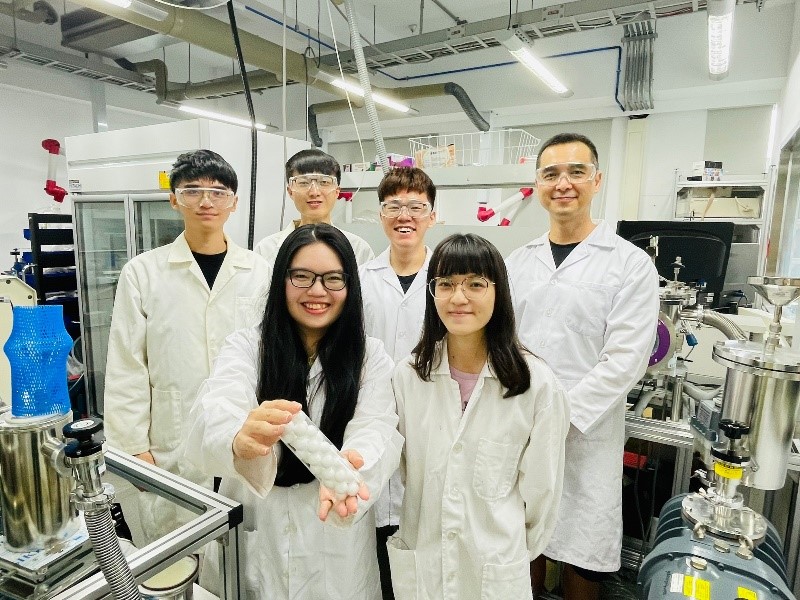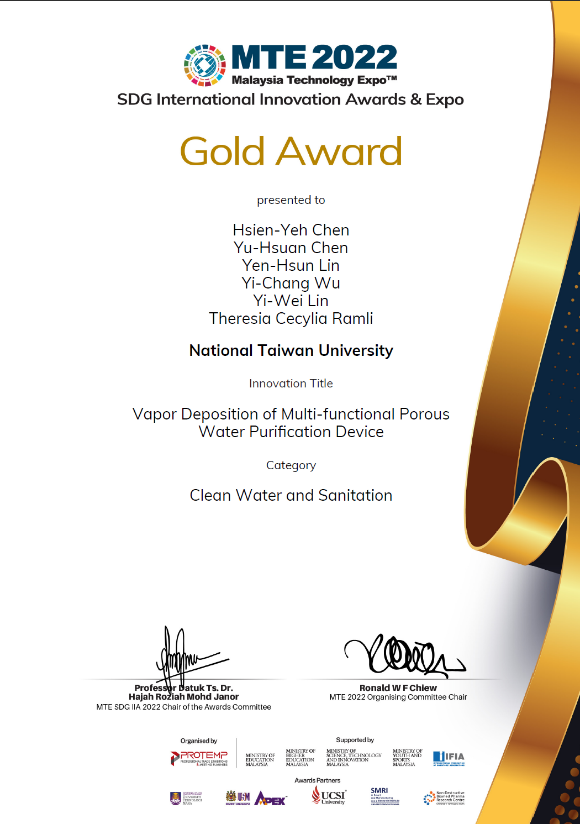NTUCOE Wins 2022 MTE-SDG International Innovation Gold Award

In 2022, a total of 217 teams from all over the world participated in the Malaysia Technology Expo (MTE) SDG International Innovation Awards & Expo, and the teams from Taiwan won one gold and six silver awards. The only gold award went to the team of Prof. Hsien-Yeh Chen’s lab from the Dept. of Chemical Engineering. The product invented is a “Vapor Deposition of Multi-functional Porous Water Purification Device”, which can improve the efficiency of wastewater treatment. It is hoped that with this product, water resources can be recycled efficiently so as to help alleviate the issues of insufficient water resources and unstable water quality. In this way, better public hygiene quality can be achieved, and the sustainable development of clean water and public hygiene can be secured. The improvement of water purification technology will also promote people’s health and well-being, and bring forth a more livable environment for people all over the world.
The goal of the MTE-SDG International Innovation Gold Award is different from other invention competitions, as it seeks inventions highlighting the significance for sustainable development. The submitted inventions must meet the 17 UN SDGs before they can participate in the competition, which means the threshold is higher than other competitions of the same nature.
The “Vapor Deposition of Multi-functional Porous Water Purification Device” which won the gold award takes advantage of the innovative and eco-friendly technology of chemical vapor deposition (CVD) polymerization, where vapor-phase monomers react to form pure solid films directly on the surface of a substrate. The CVD process is non-toxic and solvent-free, with a nearly 100% conversion rate, and is simple to scale up. Using an FDA-certified high-biocompatible polymer material, a porous and multi-functional high-efficiency water filtration device can be created at a much affordable cost, allowing mass production in the future. The product is expected to help improve water quality by reducing the release of pollutants, waste, and hazardous chemicals/materials. In addition, it can also reduce the proportion of untreated wastewater, increase the recycling and reuse of water resources, and ensure the sustainable supply and recycling of water resources.
The device encapsulates certain bacteria and its enzyme regulator, using the high-biocompatible polymer material to induce the bacteria to produce a large number of active enzymes capable of degrading wastewater contaminants. To further enhance its effectivity in decomposing pollutants, activated charcoal recovered from waste is also encapsulated together with the bacteria to absorb heavy metals in the wastewater. The award-winning technology has obtained patents from countries including the United States, Taiwan, Japan, and South Korea, and is in the process of industry-academia collaboration and technology transfer with listed companies. It is hoped that after mass production, the product can effectively help promote the concept of biomass cycle to solve wastewater issues and lead to the sustainable development of water purification and hygiene to ensure that everyone in the world can have access to clean water resources.
